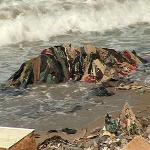24 September 2010

Photo: FSN
Off the coast of Saida, Lebanon garbage spills into the Mediterranean Sea from what is known locally as "trash mountain"
The Lebanese city of Saida is known for its historic ruins dating to the 5th century BC. It also is known for its giant garbage dump, which residents call "trash mountain." The mountain has grown steadily for more than 30 years, and city residents, tourists and environmentalists say it is a growing source of frustration to them.
Lebanon's 150-kilometer coastline is dotted with beautiful beaches, but off the coast of Saida, there are no swimmers, due to a giant heap of stinking garbage. The dump started in the 1980s, during Lebanon's civil war, when people began throwing out debris from the destruction. Over the years, it has grown into an eyesore, an environmental hazard and source of shame for the city.
Mohammed al-Saudi, mayor of Saida, was elected on a platform of getting rid of the trash mountain.
"What we have in Saida is really pathetic, to have a mountain of rubbish, nobody can be proud of it. We will be proud when we move it," said al-Saudi.
Environmentalists say the mountain is a threat to marine life and coastal ecosystems. Because there is no barrier between the trash and the sea, the garbage often drifts straight into the water, killing fish and consequently the livelihoods of local fisherman.
The dump is a health hazard, says Wael Hmaidan, executive director of Indy Act, a non-profit group that works on waste solutions.
"Saida dump burns periodically, and the direction of the wind takes all these toxic fumes into the city, Saida, so you can say on weekly basis, the people in Saida breathe this toxic air," noted Hmaidan.
Many residents doubt the government can fix the problem, but the newly elected mayor is taking action. Al-Saudi says there are plans in place to build both a waste treatment facility and a three-kilometer barrier that would keep the trash from spilling into the sea.
Saudi Arabia has already donated $20 million towards fixing the problem, and the Lebanese government has pitched in, too. The work is expected to take two to three years and will cost upwards of $30 million.